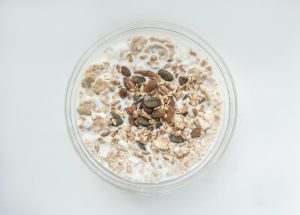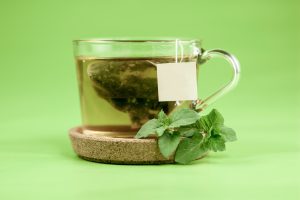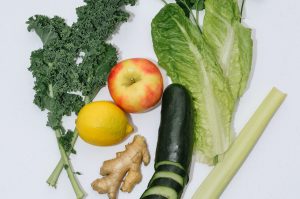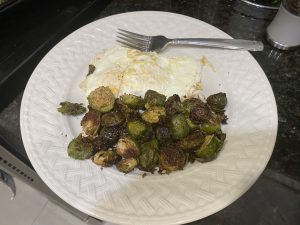diabetes
Breakfast Congee Ideas

For anyone who is vegan, sensitive to eggs, or just dislikes them, here is a breakfast idea I’ve been experimenting with, both for the sake of variety and, well… experimentation.
In China, (white) rice congee is a common breakfast, often with egg and pickled vegetables, although I realize in the States rice is rather vilified for being a simple carb and high on the glycemic index. While this might be the case, it is also a food that is very gentle on the stomach and internal organs, which from our perspective aids in absorption and digestion, and in the proper dosages can be beneficial. However, for those who can’t get past the glycemic index, I recommend using quinoa, millet, or amaranth.
1 cup of your grain of choice
5 cups of liquid (if you’re going to make the sweeter, I recommend some kind of dairy-free milk—if you’re going for the probably healthier, more Oriental style I recommend just water or either vegetable, beef, or chicken broth) Oils don’t mix as well with the sweet flavors so if you’re making the sweeter version be sure to stir often so as to avoid sticking to the pot.
Boil and simmer about 15-25 minutes, or until it is the consistency of porridge.
Treat the sweet version like you would oatmeal: Top with berries, granola, as little maple syrup as you can discipline yourself to, cinnamon, and/or nuts if you like.
For the Asian version I recommend leftover vegetables and/or pickled cabbage or kraut. Plus, an over-easy or boiled egg if you want the best of all worlds.
Enjoy warm if possible! For those of us with babies or toddlers, we long for the days when we will return to eating hot food.
Whatever you eat, EAT BREAKFAST. I cannot stress this enough. They said breakfast is the most important meal of the day because it is, not because grandma said it, but because science and biology do. Here is a link to an NIH study correlating the skipping of breakfast with increased insulin resistance and risk for diabetes: https://www.ncbi.nlm.nih.gov/pmc/articles/PMC7246451/
I like coffee as much as anyone, but coffee alone (or with a piece of toast) is not breakfast. Protein and/or fat should be consumed, preferably in great quantity.
Nor do I doubt the potential benefits of intermittent fasting, but it is more biologically aligned to skip dinner—not breakfast. If this is impossible, maybe a later breakfast, like 9am? Supposedly, any longer than 2-3 hours after waking constitutes “skipping breakfast,” which is to say the insulin resistant mechanism is set in motion by that time.
If you have no appetite for breakfast this probably indicates your dinner being not fully digested and some metabolic syndrome at work. Please reach out—or try licorice and/or ginger tea 🙂
Is Green Tea Healthy (for you)?
 In the western world we are often guilty of over-polarizing and labeling. This political viewpoint is good, that one is bad, this diet is healthy, that one is not. Further on that point, one food is healthy—while that one is not.
In the western world we are often guilty of over-polarizing and labeling. This political viewpoint is good, that one is bad, this diet is healthy, that one is not. Further on that point, one food is healthy—while that one is not.
While there are many foods that can be oversimplified and universally agreed upon—refined sugars are pretty much always bad and steamed vegetables good—most others depend on the dose, the patient, and time of year. For example, red meat in the winter for an anemic girl trying to conceive is eons more advisable than it is in the summer for an overweight male alcoholic trying to tame his heartburn. Also from a Chinese medical perspective, eating 5-6 ounces of red meat 1-3 times a week alongside vegetables will have an infinitely different systemic effect than 16 ounces 3-5 times a week alongside bread.
Green tea and kale have earned great reputations in the west, polarized as “good,” labeled “healthy,” and presumed to help anyone who consumes them, no matter the body type or time of year. From a Chinese medical perspective: False.
Almost anyone who’s ever drank green tea on a completely empty stomach has experienced the nausea or queasiness its bitter properties can induce. Bitter foods and herbs, while integral to a healthy diet and our pharmacopeia, are harsh on the stomach and less advisable for “Tai Yin” patients—those with weaker, more vulnerable stomachs. Such people generally do better with hot black teas, such as pu-erh or Earl Grey.
When written into herbal formulas, bitters are generally dosed lower and balanced with acrid and/or sweet-flavored herbs. This doesn’t mean to always consume your green tea with sweets, but it is that much more encouraged to never be drank cold or on an empty stomach. In fact, green is the one kind of tea we might encourage to take with honey—that is as long as you’re not the snob that I am, in refusal to corrupt any tea (or coffee) with outside flavors.
The same principle applies to kale. While undoubtedly possessing of all the literal health benefits it claims to, kale is a bitter green, therefore a bit more difficult to digest than other veggies. For this reason, it is important to always consume cooked, with warming spices, such as garlic, onions, or ginger to aid in proper metabolism. I’m not sure about honey on kale—maybe in the context of a salad—although in that case the raw food might cancel out any benefits of the honey. Better to have it with rice or yams to balance your “formula.”
According to teachers, green tea is best taken hot, more in the summer than winter, and more after a night of red meat and/or alcohol to sort of “drain” the heat that these foods create in the gut. Personally, I almost always drink green tea the morning after I go to baseball games! In these instances, the benefits far outweigh its “side effects.”
Please fall victim as infrequently as possible to the idea that certain foods are always healthy or unhealthy. This is rarely the case, also rare that the opinion of the general American public on anything health-related is accurately informed. If you have any questions about a particular food, please don’t hesitate to ask. And don’t take too much kale or green tea.
The Importance of Bland, Sour, & Bitter Foods
 There are three flavors that are resoundingly unrepresented in the typical, daily, western diet, whose void is arguably part of the cause of our leading all first world nations in major disease. Sour foods, bitter, and bland foods all induce important healing mechanisms in the body that can only be fully understood through Chinese herbal medicine.
There are three flavors that are resoundingly unrepresented in the typical, daily, western diet, whose void is arguably part of the cause of our leading all first world nations in major disease. Sour foods, bitter, and bland foods all induce important healing mechanisms in the body that can only be fully understood through Chinese herbal medicine.
Sour foods have an astringent effect, which makes it very curious why so many Americans drink lemon water or tea when they have a cold or virus, which we want to do anything but astringe. From our perspective foods like lemon, pickles, (apple cider) vinegar, and sauerkraut might be great for improving immune function to prevent contracting colds, but once we are sick, acrid foods such as cinnamon, ginger, and garlic are more advisable.
Sour foods help to conserve (by astringing) the body’s cellular energy and healthy fluids. If we are completely burnt out, or experiencing symptoms such as muscle cramps, or getting a second wind late at night that prevents a healthy bedtime, these might all be requests from our body for more astringing of resources. Personally, I enjoy lemon water, or sprinkling it on kale, broccoli, and/or asparagus. Tomatoes are great this time of year and sauerkraut is especially balancing with spicy foods. Since the spice will naturally bring fluids up and out, we can use the kraut to counteract this effect and keep nutrients inside. Of course, sauerkraut is generally taken raw, so it is important to eat in conjunction with cooked foods or hot tea to fully digest.
The bitter flavor must be hands down the most unpopular in America, and the reason I figure it to be healthy is because my 2-year-old hates it more than anything—while obviously preferring sweet to anything. In Chinese medicine the bitter flavor clears heat (or inflammation) from the body, which is especially important for the next two months of the year. Scutellariae root clears heat from the lungs, Coptis root from the microbiome, and phellodendron from the urogenital microbiome.
These make up the “three yellows,” and if I’ve ever put them in your herbal formula you’ve likely complained to me the following week. Instead, regular consumption of unsweetened green and/or dandelion tea, most leafy greens, and cabbage can help to mature your palette all while reducing the kind of systemic inflammation that tends to rise eventually into the chest or central nervous system later in life. If you must have sweets after dinner, do so with either hot dandelion or barley tea to counter their effect.
The bland flavor is the toughest for me, because like most people with “damp heat” internal body types, I love spices and flavors, and especially love cooking vegetables in a way that is delicious and not so boring. But while there is a time and place for culinary creativity and indulgence, plain steamed vegetables were a staple in the diets of most human beings for centuries prior, which happened to be centuries of much fewer diseases. Sure, people weren’t living as long, but chronic illness in 40-year-olds was much rarer than it is today.
Poria mushroom is one of our most commonly used bland herbs for draining dampness from the gastrointestinal and urogenital microbiomes. Its bland flavor helps to modulate urinary function and reduce pathogenic fluid retention, and by doing so it has the additionally desirable side effect of calming our minds and spirit. How does this work? By reducing the proverbial internal traffic jams of unwanted fluids, our healthy fluids can then more easily circulate up to and from the central nervous system without diversion or congestion. If spicy foods ramp us up, it should be pretty deductive that bland will calm us, and who couldn’t use more calm?
One idea to incorporate this all into a meal is steamed or boiled broccoli (dress with olive oil if you like), sauteed leafy greens with garlic, salt, and pepper, any tofu or animal protein prepared to taste, and a glass of lemon water, and/or sauerkraut on the side; followed by a hot cup of dandelion or barley tea, with honey if you must.
Thirst, Sweat, & Urine: What is Normal?

In contrast to the requisite ruling out of red flags by most nurses in conventional medical settings, the reason Chinese Medical practitioners ask about almost every system in your body is because we are diagnosing based on complete patterns—not just symptoms.
For example, if someone comes in for acid reflux, we cannot know their prescriptions until we know how often they urinate or poop, what each one is like, whether they experience headaches or dizziness, which part of the head they get their headaches in, how is their appetite, how thirsty they are during the day versus in the evening, etc. etc. This is because we are one of the only true forms of holistic medicine.
So, what is normal?
A normal amount of urination is approximately 6 times a day (yes, this includes waking at night). Much less than that and you are likely either retaining, or not drinking enough water in the first place. More than 6 indicates either a weakness in the urogenital microbiome, or excessive inflammation in the urogenital microbiome, which over time can lead to local weakness by putting strain on it. The remainder of the intake questions will determine which of the two is the case.
People should sweat, but not excessively so. Chinese Medicine is critical of HIIT or marathon training, hot yoga, and sauna therapy in most cases. While these might all feel great in the short-term and/or be proven to offer certain isolated benefits in the short-term, we believe they ultimately deplete the body’s healthy metabolic fluids. On the other hand, never sweating (exercising) at all is obviously just as harmful.
While some people barely break a sweat even when they exercise, others are drenched by the time they finish their morning commute, especially triggered by certain climates or seasons. The former can either indicate body fluid depletion or a malfunction of the immunological “qi.” The latter can either indicate inflammation, fluid retention, or also a malfunction of the immunological “qi.” This is where diagnoses and prescriptions get tricky.
Many western doctors have now begun to recognize the health benefits of the Chinese herb, astragalus, which on one hand is great. On the other hand, their recognition by way of empirical studies poses the challenge of having no comprehension of Chinese Medicine. If you give astragalus to the former example of a “cold-body person” with a simple immunological malfunction they will feel amazing and sing your praises. If you give it to someone with both immunological malfunction AND fluid deficiency it will do almost nothing. Worse, if you give it to a “hot-body person” with inflammation and fluid retention they will feel much worse.
Finally, it is normal to be thirsty, for 6-9 cups of water per day. A lack of thirst tells us there is fluid retention in the microbiome, signaling to the brain that it’s got plenty of liquid down here—no need to hydrate! This is dangerous, and better to fake it ‘til you make it in acquiring thirst. On the other pole are those who are ravenously or insatiably thirsty, which informs us of inflammatory heat in either their respiratory microbiome, gastrointestinal microbiome, or both, drying out their fluids. As always, the most complicated patterns are those who are generally unthirsty followed by sudden bouts of desperate thirst. This is a combination pattern that requires more thought, trial, and error.
I hope this was interesting and informative. One of western medicine’s shortcomings is its reliance on tests and labs to determine whether we are healthy or normal. While these are undeniably valuable, they tell only part of the story, which is why so many diseases get caught too late. Chinese Medicine is more brilliant in its neurotic recognition of pathologies in any abnormality, any imbalance, as something to rectify before it spirals into disease.
Chinese Medicine Breakfast Ideas

I’m not sure what the time or place was that berthed the maxim, Breakfast is the most important meal, but they were obviously more attuned with human biology than our own. In Chinese Medicine’s circadian clock, 7am-9am is considered the “time of the stomach.” The prior, 5-7am, corresponds to the large intestine, which makes it the ideal and most common time for bowel movements; before that, 3-5am, to the lungs, which is why many people with chronic or acute coughs are disrupted by them in the middle of the night.
While this may all sound like esoteric medical theory, it aligns perfectly with modern biomedical understanding: The reason 7-9am is the time of the stomach is because it is when metabolism is strongest—when our bodies are most sensitive to the insulin hormone, whose job it is to break down glucose from food and transform it into nutrients.
We say “stomach qi.” They say insulin secretion. Same thing. Of course, when people lack a morning appetite or experience a weaker metabolism in the morning we consider this to be pathological, diagnostically informative. Since for most of us 8am is at least 12 hours since our last meal this should not sound far-fetched. Chinese Medicine believes when we do not adequately exercise our microbiome in the morning we weaken it—a similar use it or lose it view as to the muscles, tendons, and ligaments that are ultimately nourished by the gut as well.
Intermittent fasting can have many health benefits when done responsibly, but if one intends to do it intelligently, without potentially robbing Peter to pay Paul in the long term, you would skip or have an early dinner, instead of neglecting science by skipping breakfast. I understand the potential social repercussions of this, for which I recommend compromise: Have dinner or later dinners on social nights, while on quiet nights, if it works for you keep to your fasting window.
For those who claim to not have time for breakfast, I am skeptical. As most of you know, for the past year I’ve been still running my own practice while co-parenting a 14-month old. Recently, as she has rapidly grown in physical mobility and emotional attachment, I’ve been forced to cook with one hand and arm in the morning. I’ve learned to crack and cook eggs all with one (messy) hand, and inadvertently multi-tasked into giving my left bicep a tremendous daily workout. Even on my earlier days in the office we never skip breakfast.
One of my favorite and easiest recipes are as shown above, eggs over easy with ANY roasted vegetables. As long as you can find the five minutes to wash and chop the veggies, you can then throw them on the pan, add salt, pepper, garlic powder, and flaxseed, and cook for 20 minutes, during which time you can get ready for the day (or sit cross-legged on the floor and read children’s books). When they are a few minutes from ready return to the kitchen for your one-minute, one-handed eggs. Once plated I like to add a good quality olive-oil atop the vegetables, a) to give them moisture, b) for olive oil’s health benefits. Viola! Breakfast!
In Chinese Medicine eggs are considered one of the healthiest foods in the world. They even appear in a couple of our herbal formulas that are designed to clear pathological heat from the body by nourishing our healthy fluids and blood. Between my wife, daughter, and I, we consume 3 dozen/week, and I can’t imagine where we’d be if we didn’t. Bon Appetit!
For a FREE INITIAL CONSULTATION on how Chinese Medicine might be able to help you, CLICK HERE.


